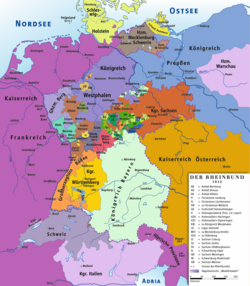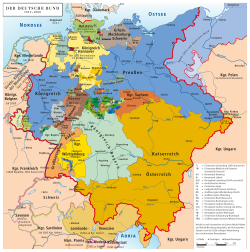County (Principality) of Reuss-Ebersdorf Grafschaft (Fürstentum) Reuß-Ebersdorf | |||||||||
|---|---|---|---|---|---|---|---|---|---|
| 1678–1824 | |||||||||
 in red Reuss-Ebersdorf | |||||||||
| Status | State of the Holy Roman Empire, then State of the Confederation of the Rhine | ||||||||
| Capital | Ebersdorf | ||||||||
| Government | Principality | ||||||||
| Historical era | Modern era | ||||||||
• Partitioned from Reuß-Lobenstein | 1678 | ||||||||
• Raised to principality | 1806 | ||||||||
• Inherited R-Lobenstein | 7 May 1824 | ||||||||
| |||||||||
Reuss-Ebersdorf[ needs IPA ] was a county and from 1806 a principality located in Germany. The Counts of Reuss-Ebersdorf belonged to the Reuss Junior Line. Reuss was successively a part of the Holy Roman Empire, Confederation of the Rhine, German Confederation, North German Confederation, German Empire and Weimar Republic before becoming a part of Thuringia in 1920.






